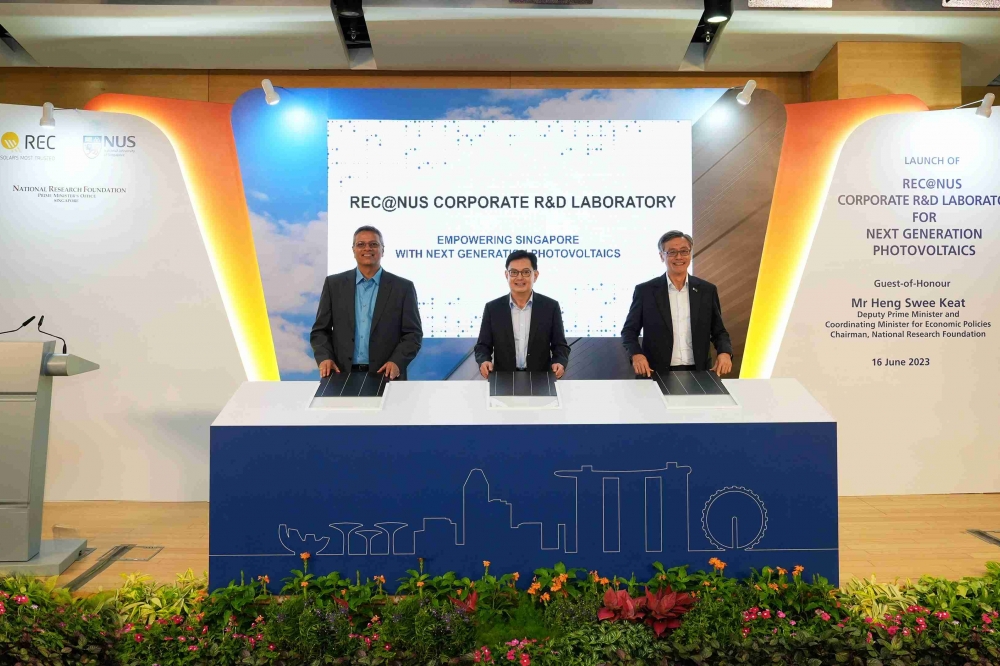Launch of REC@NUS Corporate R&D Laboratory for Next Generation Photovoltaics in Singapore

A new S$77 million research initiative has been launched last Friday at the National University of Singapore (NUS) to boost innovation and research on advanced solar cell technologies in Singapore. Over the next five years, the REC@NUS Corporate R&D Laboratory for Next Generation Photovoltaics (REC@NUS Corp Lab), which is jointly set up by the Solar Energy Research Institute of Singapore (SERIS) at NUS and REC Solar (REC), will research, develop, and commercialise disruptive solar photovoltaic (PV) technologies based on perovskite-silicon tandem solar cells.
Supported by Singapore’s Research, Innovation and Enterprise (RIE) 2025 Plan, this strategic investment in high-power clean energy solutions is crucial in accelerating Singapore’s transition to renewable energy for a greener future, and maintaining the nation’s leading position in PV R&D and manufacturing.
By bringing together NUS-SERIS’ world-class research expertise in PV technologies and REC’s deep experience in upscaling innovative solar PV technology, the new Corporate Laboratory aims to champion bold technology innovations for more powerful, more efficient, more sustainable and less costly solar energy. Successful outcomes from the Corporate Laboratory could transform the solar industry globally and, in turn, accelerate global energy transitions.
Deputy Prime Minister and Coordinating Minister for Economic Policies Mr Heng Swee Keat, who is also Chairman of the National Research Foundation, launched the new Corporate Laboratory as the Guest-of-Honour. This is the eighth corporate laboratory established at NUS.
NUS President Professor Tan Eng Chye said, “NUS’ strong research capabilities and technology leadership, coupled with active industry collaborations, have enabled the University to make significant advances in PV technologies. We have been collaborating with REC on solar PV research for around 14 years, and I am heartened that this strategic industry-academia partnership has now blossomed into the REC@NUS Corporate R&D Laboratory for Next Generation Photovoltaics, which will further consolidate and integrate our complementary strengths to make a quantum leap in solar power. I have every confidence that REC and NUS will achieve technical breakthroughs to cross the 30% conversion efficiency barrier for large-area low-cost solar cells that would accelerate solar PV deployment in urbanised and space-constrained Singapore.”
“REC has been pushing the boundaries of solar energy technology since its founding, and is committed to continuously improving efficiencies and costs, creating novel products and driving global transitions. With our in-depth expertise and cutting-edge technology, REC is known for its many ‘world’s first’ achievements and the one and only solar panel brand in the market with three prestigious Intersolar Awards. By continuously increasing the power density of solar panels and their longevity, more clean energy can be generated at lower costs, more emissions can be offset, and more resources can be saved,” explained Dr Shankar G. Sridhara, Chief Technology Officer of REC.
NRF’s Chief Executive Officer, Mr Beh Kian Teik, said, "The REC@NUS Corporate R&D Laboratory is a showcase of partnership between our academia and industry, in support of Singapore’s decarbonisation efforts. As one of the leading solar laboratories in the world, SERIS had provided novel solar solutions unique to Singapore’s urban environment, such as floating solar PV on our reservoirs and building-integrated photovoltaics (BIPV). These innovative technologies enabled valuable solar deployment opportunities in our land-scarce nation as Singapore strives to achieve net-zero emissions by 2050.”
The REC@NUS Corp Lab will be led by two Co-Directors: Professor Armin Aberle, CEO of SERIS, and Dr Shankar G. Sridhara, Chief Technology Officer of REC.
Crossing the 30 percent conversion efficiency barrier for large-area (> 400 cm2) low-cost solar cells
Singapore has identified solar energy as one of the nation’s “Four Energy Switches”. However, its widespread global adoption will require further improvements of the efficiency of energy conversion, while keeping manufacturing costs under control.
The energy conversion efficiency – i.e. the percentage of solar energy that is converted into usable electrical energy – of the best-in-class commercially available solar cells is around 24 to 25 percent today. Research communities around the world are currently finding ways to further improve the efficiency of large-area solar cells to reach the milestone level of 30 per cent or more.
Developing such cost-effective ultra-high-efficiency solar cells requires a technological transition from today’s single-junction solar cells – which use one layer of photovoltaic absorber material, typically made of silicon – to a two-junction tandem solar cell technology.
A two-junction tandem solar cell uses two layers of photovoltaic material stacked on top of each other to absorb and convert solar radiation more efficiently into electricity. The Sun-facing top cell is designed to optimally convert the visible wavelengths of the solar spectrum (from blue to red), while allowing the invisible wavelengths (near-infrared light) pass through to the bottom cell. A promising top cell absorber material is perovskite, which is a family of crystalline compounds that has been gaining attention for next-generation solar cells due to its low production cost and high energy conversion efficiency.
“The REC@NUS Corp Lab will address the technological efficiency-cost dilemma of the PV industry by demonstrating a large-area perovskite-silicon tandem solar cell technology with an energy conversion efficiency of 30 percent. It will also develop one-of-its-kind capabilities to manufacture these advanced solar cells cost-effectively to facilitate industry adoption,” said Prof Aberle.
The Corporate Lab will bring together complementary research expertise and talent from NUS and REC, in partnership with the Nanyang Technological University, to facilitate Singapore’s manufacturing of cost-effective high-performance tandem solar cell technologies. The project will comprise about 40 researchers and aims to train up to 20 PhD students over the next five years.


































